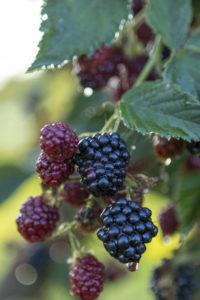 Have you ever gone out picking blackberries (or any other kind of berry for that matter)? It’s fun, strolling among the blackberry brambles, getting your hands stained with berry juice, and eating as many as you pick. At least that’s the way I remember it from my childhood. I haven’t been berry picking in a very long time. Now I live in a place in the world where berries like raspberries, blueberries and blackberries don’t grow because of the climate. How sad that people who live their entire lives in such places never get to have experiences like the ones I remember.
Have you ever gone out picking blackberries (or any other kind of berry for that matter)? It’s fun, strolling among the blackberry brambles, getting your hands stained with berry juice, and eating as many as you pick. At least that’s the way I remember it from my childhood. I haven’t been berry picking in a very long time. Now I live in a place in the world where berries like raspberries, blueberries and blackberries don’t grow because of the climate. How sad that people who live their entire lives in such places never get to have experiences like the ones I remember.
 You wouldn’t think that blackberries and graves have much in common other than both being rooted in the earth. But speakers and authors of Middle English saw things differently. They used ‘blackberry’ not only as a noun but as a verb. Modern English does not. You and I can pick blackberries, but we don’t blackberry and are never blackberried. Yet the verb form was used in Medieval English. The Middle English Dictionary provides this example from The Pardoner’s Tale in Chaucer’s Canterbury Tales. “I rekke neuere whan that they been beryed Thogh that hir soules goon a blakeberyed.” A rough translation in to Modern English is “I never knew that when they had been buried, though, that their souls had been buried black.” In other words, their souls had been sent to Hell. The play on words that tells someone to ‘go get blackberried’ meaning ‘go to Hell’ has disappeared along with the use of Blackberry as a verb. What do you say? Shall we bring back this colorfully polite way of cursing someone? Leave a comment, please, and share your thoughts. Or let us know of some colorful phrase you commonly use.
You wouldn’t think that blackberries and graves have much in common other than both being rooted in the earth. But speakers and authors of Middle English saw things differently. They used ‘blackberry’ not only as a noun but as a verb. Modern English does not. You and I can pick blackberries, but we don’t blackberry and are never blackberried. Yet the verb form was used in Medieval English. The Middle English Dictionary provides this example from The Pardoner’s Tale in Chaucer’s Canterbury Tales. “I rekke neuere whan that they been beryed Thogh that hir soules goon a blakeberyed.” A rough translation in to Modern English is “I never knew that when they had been buried, though, that their souls had been buried black.” In other words, their souls had been sent to Hell. The play on words that tells someone to ‘go get blackberried’ meaning ‘go to Hell’ has disappeared along with the use of Blackberry as a verb. What do you say? Shall we bring back this colorfully polite way of cursing someone? Leave a comment, please, and share your thoughts. Or let us know of some colorful phrase you commonly use.


Recent Comments